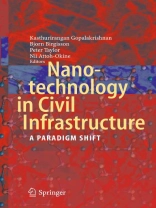Nanotechnology in Civil Infrastructure is a state-of-the art reference source describing the latest developments in nano-engineering and nano-modification of construction materials to improve the bulk properties, development of sustainable, intelligent, and smart concrete materials through the integration of nanotechnology based self-sensing and self-powered materials and cyber infrastructure technologies, review of nanotechnology applications in pavement engineering, development of novel, cost-effective, high-performance and long-lasting concrete products and processes through nanotechnology-based innovative processing of cement and cement paste, and advanced nanoscience modeling, visualization, and measurement systems for characterizing and testing civil infrastructure materials at the nano-scale. Researchers, practitioners, undergraduate and graduate students engaged in nanotechnology related research will find this book very useful.
Table des matières
Multifunctional and Smart Carbon Nanotube Reinforced Cement-based Materials
.-
Applications of Nanotechnology in Road Pavement Engineering
.-
Application of Nanoscience Modeling to Understand the Atomic Structure of C-S-H
.-
The Effect of SWCNT and Other Nanomaterials on Cement Hydration and Reinforcement
.-
Nanomaterials-enabled Multifunctional Concrete and Structures
.-
Nano-Optimized Construction Materials by Nano-Seeding and Crystallization Control
.-
Next-Generation Nano-based Concrete Construction Products: A Review
.-
Optimization of Clay Addition for the Enhancement of Pozzolanic Reaction in Nano-modified Cement Paste
.-
Characterization of Asphalt Materials for Moisture Damage Using Atomic Force Microscopy and Nanoindentation
.-
Nanoclay-modified Asphalt Binder Systems
Optimization of Clay Addition for the Enhancement of Pozzolanic Reaction in Nano-modified Cement Paste
.-
Characterization of Asphalt Materials for Moisture Damage Using Atomic Force Microscopy and Nanoindentation
.-
Nanoclay-modified Asphalt Binder Systems












